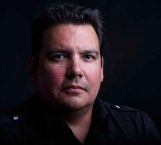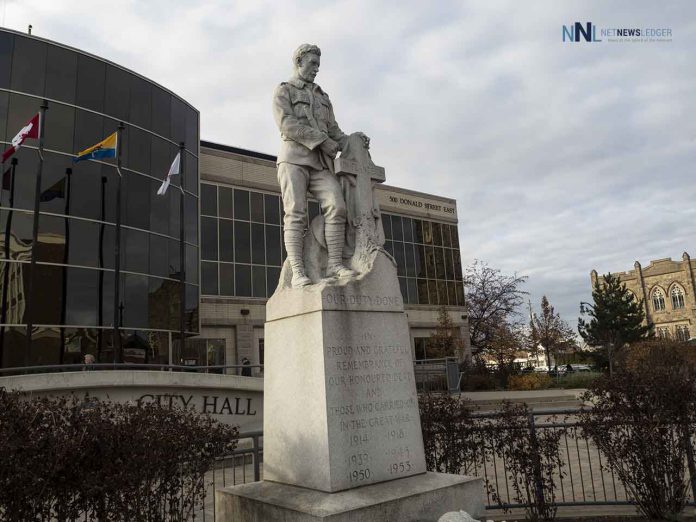WINNIPEG – On Saturday, the morning after National Aboriginal Veterans Day, Métis actor Gabriel Daniels and I meet in a Winnipeg coffee shop to discuss his role in Stand!
The movie-musical is set during the 1919 Winnipeg General Strike and is based on the Danny Schur-Rick Chafe stage musical Strike!.
Gabriel plays a Métis soldier who has returned from the First World War. He’s caught between his racist army buddies and their attacks on immigrant workers who are struggling to get a fair wage.

“It’s a role not just about witnessing violence but what he does about it — an experience so many Indigenous peoples know well,” he says.
We begin by talking about Indigenous veterans and how he played one in the film.
He tells me he spent years researching Tommy Prince who, like most Indigenous veterans, fought an overseas war against guns and gas and at home against privilege and power. He tells me he tried to show the same “humanity” Prince showed when facing discrimination.
We openly wonder about men such as Prince and the more than 10,000 First Nations, Métis, and Inuit soldiers who served in the First and Second World Wars, and Korean War, even though they weren’t Canadian citizens at the time.
We wonder why our grandfathers, both veterans, went to war: they weren’t conscripted, they chose to go.
We talk about how they experienced racism at home and abroad, likely lived with post-traumatic stress disorder, and brought so many of those violent legacies home to our families.

Gabriel and I marvel at the honour, integrity, and dignity our warrior grandfathers showed, and a commitment to the British Crown that was never returned.
Even though we have just met, we cry together. We miss them, even though we barely knew them.
Then, we start talking about what happened after their wars.
Both our soldier grandfathers were fathers to sons – our fathers. Both were terrible dads. Gabriel’s father abandoned Harry. My grandpa drank and hurt Murray.
Despite this, both our fathers grew up to be incredible men who did incredible things.
Gabriel’s father began arguably the most important court battle in modern Métis history, the famous Daniels v. Canada case. It argues that the federal government recognize the Métis as Indians under the Constitution.
Gabriel replaced his father in the case as lead plaintiff after Harry died in 2004. The case went all the way to the Supreme Court and was decided in favour of the Métis in 2016. Now, Canada must recognize the Métis nation, settle land claims, and provide federal programming such as education and housing.
My father was the first Indigenous judge in Manitoba, and the second in all of Canada. He was the chief commissioner of the Truth and Reconciliation Commission who came up with the commission’s 94 calls to action.
Now, I teach, write, and travel around the country working with child welfare workers, teachers, lawyers, and political leaders on how to implement the TRC and reconciliation.
Both Gabriel and I have inherited our father’s legacies.
But not just the good parts, the complicated ones, too.
Both our dads were away much of the time. Both had difficult relationships with our moms and didn’t live with us. Both phoned and visited a lot but gave a great deal of their lives to our nations, our people, and the future. Both missed birthdays and hockey games. Both, at times, broke our hearts. But we love them anyways. So much.
Now, Gabriel and I are trying to be dads. We proudly speak about our daughters – Gabriel has two, I have one. We talk about how scary this is and how hard it is. We talk about our fears and how we want to run sometimes, but we try and want to be there for them in every single way we can.

Gabriel admits he has been asked to run for office as a Métis politician. “I have a famous name and people think my dad comes with me,” he tells me.
“I told them I have to learn to become a good dad first,” he says, “so I said no.”
I then tell him I’ve said no to similar calls, too.
We agree that being a dad is the hardest thing we have ever done. We acknowledge that we stumble more then we like. We also know we are away too much in our careers, too. But, we love and struggle and do everything we can to be a good dad no matter all else.
It’s at this point we cry together a second time.
You see, our complicated roles as fathers didn’t just begin with us but with the men in our lives – men who inherited violence in every step of their lives and did the best they could. They had imperfect dads, who created imperfect sons, who became imperfect dads, who created imperfect sons – for the good, the bad, the ugly, and the beautiful.
These are our dads. Our grandfathers. Opaapaayag. Omishoomisag.
Gabriel and I finish our coffee and promise to meet again.
I found a brother this National Aboriginal Veterans Day.
An imperfect one, but one I know well.
 Niigaan Sinclair
Niigaan Sinclair
Originally appeared in the Winnipeg Free Press in November 2019. Republished with the permission of the author.
The views, opinions and positions expressed by all columnists and contributors are the author’s alone. They do not inherently or expressly reflect the views, opinions and/or positions of NetNewsLedger.





